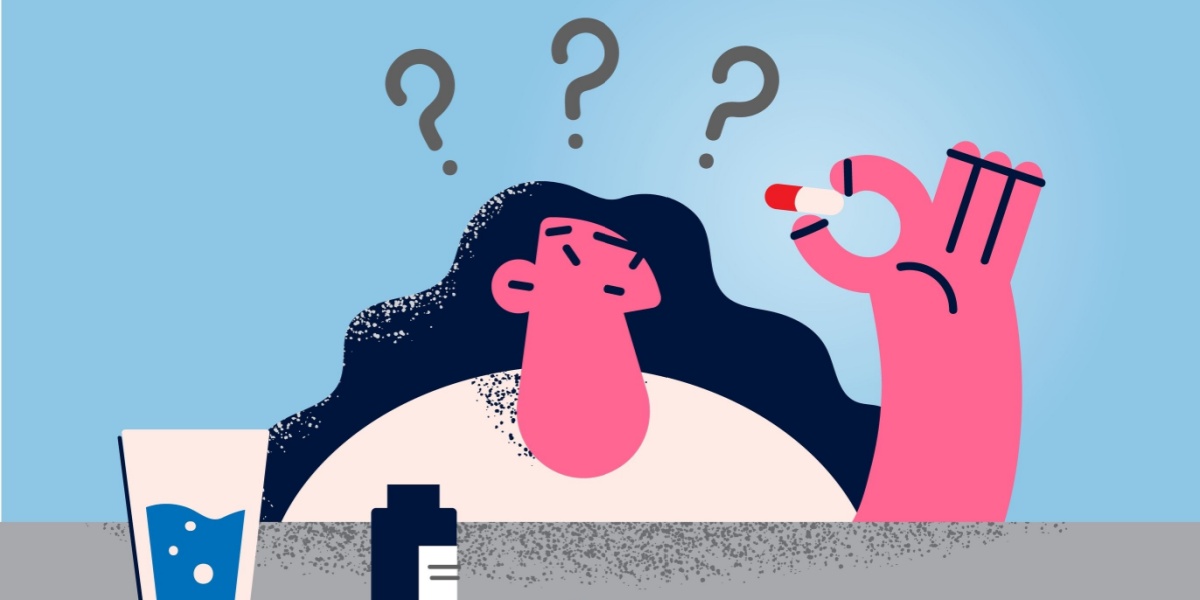Antidepressants are one of the most commonly prescribed medications in America. Though addiction may not be as common as other substances, continued antidepressant abuse can lead to dangerous health risks.
- Antidepressants are widely considered to be non-addictive. However, prolonged abuse can lead to physical dependence, withdrawal when use stops, and cravings
- Antidepressants, even when abused in high doses, do not cause euphoric side effects like other forms of substance abuse
- If a course of antidepressants is stopped abruptly it can cause Antidepressant Discontinuation Syndrome, which can cause uncomfortable flu-like symptoms

What are antidepressants?
Antidepressants are a form of prescribed medication used to treat depression in moderate to severe cases. Antidepressant medications usually come in one of two forms, selective serotonin reuptake inhibitors (SSRIs) and serotonin and norepinephrine reuptake inhibitors (SNRIs).
SSRIs help with the symptoms of depression by altering the brain’s chemical balance of serotonin, affecting the user’s mood, and helping with positivity. SNRIs have a similar effect and interact with the brain’s levels of serotonin and norepinephrine. Antidepressants are also often prescribed to help patients who suffer from obsessive-compulsive disorder (OCD) and Generalized Anxiety Disorder.
Antidepressant medication prescriptions have increased in recent years to help in relieving unwanted symptoms such as anxiety and excessive depression in both adults and children. After an extensive study, B. Lesser (2021) found that “the prevalence of antidepressant medications among adults aged 12 and up was 12.7%, 8.6% among men, and 16.5% among women”. [3]
Most prescribing doctors will give a course of antidepressant treatment over one year to ensure that patients get the full effect of the drug. As some sufferers of depression will only require six to eight months of treatment and some will require more, it is always recommended that a full evaluation is given before someone stops taking antidepressants. [3]
Types of antidepressant
The most common types of antidepressant medications are:
- Selective serotonin reuptake inhibitors or SSRIs: Prozac, Paxil, Lexapro, Sarafem, Celexa, Luvox, and Zoloft.
- Serotonin receptor antagonist and reuptake inhibitor (SARIs): Trazodone, Etoperidone, Nefazodone
- Monoamine oxidase inhibitors or MAOIs: Manerix, Marplan, Emsam, Parnate, and Nardil.
- Serotonin and noradrenaline reuptake inhibitors or SNRIs: Effexor, Cymbalta, and Pristiq.
- Tricyclic antidepressants: Doxepin, Tofranil, Elavil and Norpramin.
- Norepinephrine and dopamine reuptake inhibitors or NDRIs: Wellbutrin and Zyban.
- Noradrenergic and specific serotonergic antidepressants or NaSSAs: Remeron.
Physicians are increasingly moving towards SSRIs over tricyclics and MAOIs as the latter require more stringent diet restrictions and can cause adverse side effects. Antidepressants are often prescribed alongside anti-anxiety medications such as Valium and Xanax as depression and anxiety are common co-occurring disorders. As benzodiazepines like Xanax hold a high potential for abuse, the combination prescription of these medications can lead to adverse side effects and substance abuse. [3]
Are antidepressants addictive?
Antidepressants are not addiction-forming on their own, though they are often abused alongside other substances.
There is much discussion and debate around the addictive potential of SSRI and SNRI drugs and whether antidepressants can be labeled as addictive substances. Substance abuse is known to cause the brain’s chemical makeup to change by interfering with neurotransmitter development. In addition, continuous abuse of illicit substances and alcohol can lead to physical and psychological dependence to maintain the same effects or ‘high’ first experienced. This dependence can lead to addiction, resulting in adverse and potentially fatal effects when withdrawal symptoms or cravings become too severe.
Though antidepressants are often referred to as happy pills, they do not produce the same sense of euphoria and artificial happiness that other prescribed and illicit substances are known to do. Instead, SSRIs aim to rebalance the brain instead of simply increasing pleasant feelings and not leading to a high on their own. This dichotomy has led to most medical professionals deciding that antidepressants are not addictive in a traditional sense.
There is also no substantial evidence to show that abusing SSRIs causes a tolerance to the drug to form, which again reduces its validity as an addictive substance. There has been evidence of antidepressant dependency in some users, with withdrawal symptoms being the strongest indicator.
Like most forms of addiction, a person with an antidepressant use disorder will be diagnosed by a licensed professional using these 11 criteria outlined by the Diagnostic and Statistical Manual of Mental Disorders, 5th edition (DSM-5)[4]:
- Hazardous use: You have used the substance in ways that are dangerous to yourself and others, i.e., overdosed, driven while under the influence, or blacked out.
- Social or interpersonal problems related to use: Substance use has caused relationship problems or conflicts with others.
- Neglected major roles to use: You have failed to meet your responsibilities at work, school, or home because of substance use.
- Withdrawal: When you stop using the substance, you experience withdrawal symptoms
- Tolerance: You have built up a tolerance to the substance, so you must use more to get the same effect.
- Used larger amounts/longer: You have started to use larger amounts or use the substance for longer amounts of time.
- Repeated attempts to control use or quit: You’ve tried to cut back or quit entirely but haven’t been successful.
- Much time spent using: You spend a lot of your time using the substance.
- Physical or psychological problems related to use: Your substance use has led to physical health problems, such as liver damage or lung cancer, or psychological issues, such as depression or anxiety.
- Activities given up to use: You have skipped or stopped doing activities you once enjoyed to use the substance.
- Craving: You have experienced an intense craving for the substance.
These criteria are measured by the substance’s negative impact on a person’s life, including physical, psychological, and behavioral measures. The standards are measured against the previous 12 months of substance use as mild, moderate, and severe. For example, a score of 2-3 is considered mild, 3-5 equates to moderate, and a score of six or more would be characterized as severe. While addiction to antidepressants is hard to classify, if you or someone you know is suffering from antidepressant dependence or abuse, even severe antidepressant addictions can be treated and overcome.
Antidepressant addiction vs. Dependence
Antidepressant dependence refers to the user’s need to take the drug to avoid adverse side effects such as withdrawal symptoms and support any developed tolerance, though the latter is highly uncommon.
Antidepressant Addiction is a chronic, neurobiological disease categorized by someone who meets a number and factors of the criteria used to determine the severity of the addiction, as outlined in the DSM-5 noted above. In addition, a predisposition to addiction can be influenced by risk factors such as environment, genetics, and mental illness.
Effects of antidepressant abuse
Antidepressants are one of the most prescribed forms of medication in the United States. Many doctors suggest SSRIs and SNRIs as a safer alternative to benzodiazepines, as they have a lower potential for abuse. Despite this, some people do attempt to abuse the antidepressant medication.
The popular misconception amongst people who abuse the drug is that antidepressants can get you high or produce euphoric effects if taken in high enough doses. This is not the case as antidepressant medications work over an extended period and are designed to reprogram parts of the brain chemistry as opposed to solely affecting it short term. However, this does not stop people from abusing antidepressants. Some people combine them with other substances such as alcohol in an attempt to boost the effect. Over time, this can cause the medication to stop taking effect and lead people to take more than prescribed.
Like most medications and drugs, taking more antidepressants than prescribed, their risk for dangerous side effects and adverse reactions increases, such as the risk of seizures and overdoses.
Signs of antidepressant overdose
Signs of an antidepressant overdose can include any or all of the following:
- Impaired coordination
- Confusion
- Fainting
- Uncontrollable shaking
- Dizziness
- Irregular heartbeat
- Convulsions
The risks of antidepressants and alcohol
Alcohol is commonly combined with antidepressants to try and boost the effects or to self-medicate as the antidepressants begin to take effect. However, people who suffer from a pre-existing addiction such as alcoholism are more likely to abuse antidepressants.
People prescribed antidepressants have also been known to abuse other substances, such as opioids or marijuana, while the drugs take time to begin working.
Combining alcohol and antidepressants can cause severe physical and mental health problems, including:
- Worsened depression or anxiety
- Intense sedation
- Dangerously high blood pressure
- Impaired coordination
- Overdose
Antidepressant withdrawal symptoms
Talk to your doctor before you stop taking antidepressant drugs. It’s crucial that you do not stop taking antidepressants suddenly. Doses of antidepressants should be slowly reduced, usually over four weeks, but sometimes longer. This is to prevent any withdrawal symptoms you might get as a reaction to coming off antidepressants suddenly. [5]
Withdrawal symptoms may include:
- restlessness
- trouble sleeping
- unsteadiness
- sweating
- stomach problems
- feeling as if there’s an electric shock in your head
- feeling irritable, anxious, or confused
Withdrawal symptoms usually come on within five days of stopping the medicine and will generally last for six weeks. However, some people with severe withdrawal symptoms can experience them for several months or more.
Antidepressant discontinuation syndrome
Antidepressant discontinuation syndrome occurs when someone abruptly stops taking the medication after at least six weeks of use. The symptoms often include flu-like discomfort, insomnia, poor balance, nausea, hyperarousal, and sensory disturbances. The symptoms of antidepressant discontinuation syndrome usually last between one and two weeks and occur in roughly 20% of people who stop taking the drug abruptly.
Antidepressants and serotonin syndrome
Serotonin syndrome is a potentially life-theatening condition that results when the body has too much serotonin in it. This most commonly occurs when too many substances containing serotonin are consumed usually through prescription or illicit drugs. Read here to find out more about serotonin syndrome.
Getting help for antidepressant addiction and abuse
If prescribed antidepressants, quitting them when a dependence or addiction occurs can be extremely dangerous to mental health. Medical supervision should be used if trying to quit or even lower a dose back to the prescribed level. If antidepressants have taken control of your life or you feel your use spiraling out of control, then contact a treatment provider today to find out what help is available.


-guide-detail.jpg?v=1722502817)
-guide-detail.jpg?v=1722503273)
-guide-detail.jpg?v=1722503025)